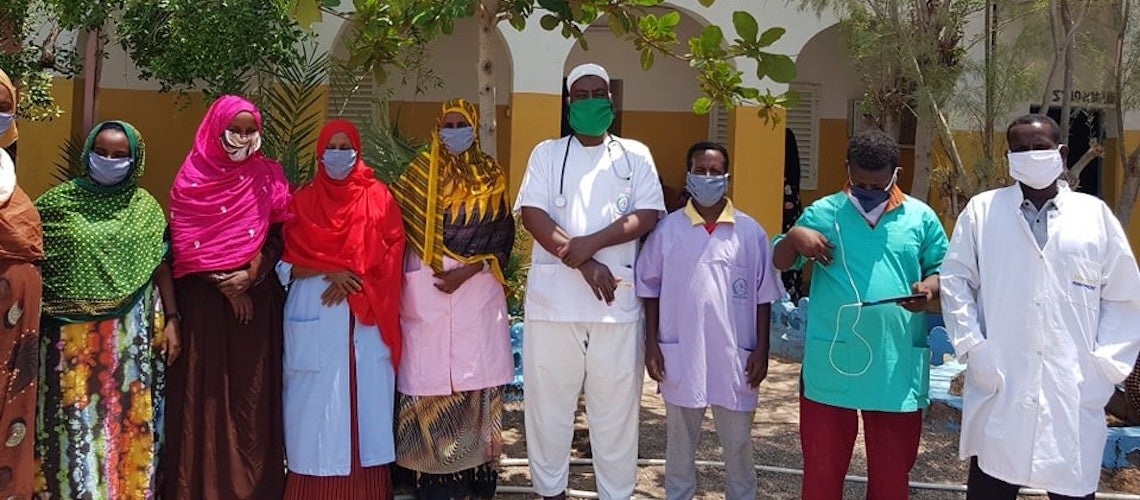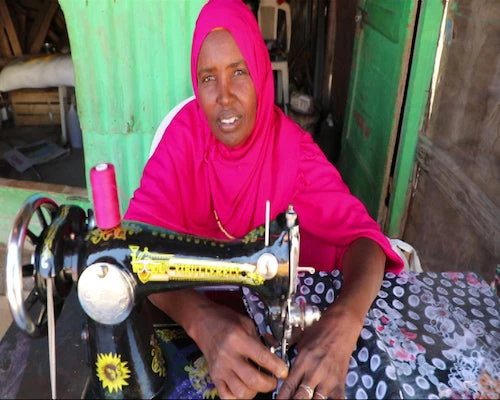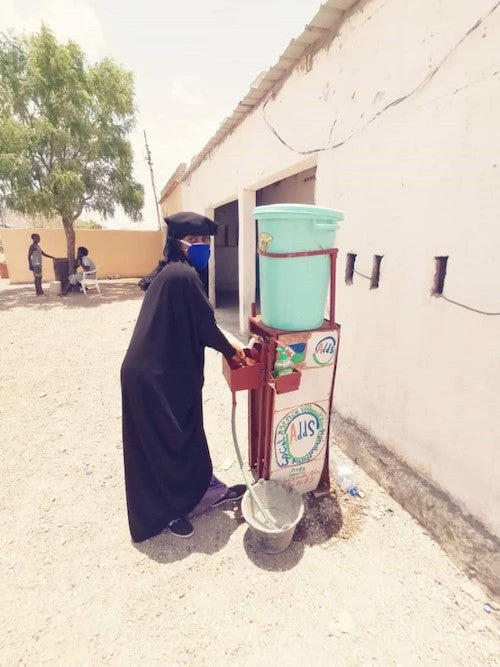 Membres d’un groupe d’aide aux femmes et personnel médical devant le centre de santé d’Obok, à Djibouti.
Membres d’un groupe d’aide aux femmes et personnel médical devant le centre de santé d’Obok, à Djibouti.
"Producing washable and reusable fabric facemasks helped us support our communities to stay safe and limit the spreading of the virus, and to get through the economic hardship that the COVID-19 pandemic created," said one of the women of a women’s livelihood group in Ali Addeh in the south of Djibouti, not far from the border with Ethiopia and Somalia.
In Djibouti, 61% of women are illiterate and only 19% of women are employed. And yet, when the COVID-19 pandemic hit the country, women’s livelihood groups in remote parts of the country took action to support public health and to generate income at a time of economic hardship. The solution? Facemasks.
Djibouti was grappling with poverty even before COVID-19 hit. About a quarter of a million people in Djibouti required direct assistance before the pandemic. With an arid desert climate, Djibouti suffers from limited water resources. Providing access to basic services for the poor is a challenge that has been exacerbated by COVID-19 — the timing for which could not have been worse. A recent prolonged drought in the region spurred desertification and exposed more than 75% of rural households to food insecurity. This included not only Djiboutian nationals living in extreme poverty, but also those that had been forcibly displaced internally and from neighboring countries.
In many places around the world, including in Djibouti, women and children have been disproportionately affected by COVID-19. They often have fewer financial assets to recover from a shock (e.g., to reopen a business after a prolonged time of lockdown) and fewer opportunities for employment. Children have been mostly affected by the disruption of their education.
When COVID-19 reached Djibouti in March 2020, the government moved quickly to prepare a COVID-19 Preparedness and Response Plan to prevent the spread of the virus and respond to its impacts. This included suspension of international travel, a major step for a country that relies on trade between the Middle East and the African continent.
In support of the Plan, the World Bank-financed Development Response to Displacement Impacts Project in the Horn of Africa (DRDIP) also reacted quickly by preparing a Response Strategy to the Coronavirus Pandemic. The DRDIP works to support the social, economic, and environmental well-being of refugee-hosting communities in Djibouti. Operating in the country since 2017, the project has proven to be an effective way to deliver development support to remote communities in Holl Holl and the Ali Addeh and Obock regions, including during the pandemic.
To help communities manage the impacts of COVID-19, the project supported awareness-raising sessions on sanitary and health measures. Livelihood activities were also adapted to support women’s and youth business groups. The adapted livelihood measures have reduced the direct impact of COVID-19 on these vulnerable groups through compensatory measures, such as the payment of rent for their businesses as well as a one-time livelihood support grant. One young person participating in the livelihood program explained, "I benefitted from a compensatory grant which helped me to compensate my fixed costs (electricity, water, telephone, rent, etc.) and a loss of income from my business."
Women’s livelihood groups also began producing facemasks. This has had two major benefits. First, from a health perspective, it has helped to address the shortage of masks in remote areas. Second, it has provided the women with an additional source of income during a time of hardship. Since April 2020, the women’s groups (consisting of a total of 328 women) have produced more than 17,500 masks in the Ali Sabieh and Obock regions. The masks have been distributed to hospitals, training facilities, transport users and other vulnerable groups to reduce the spread of the virus.
— a health center in Obock. (Photo credit: ADDS/Djibouti)
Once the COVID-19 situation improved and project activities that had been stalled restarted again (such as the project’s livelihood training sessions; but also work on the improvement of socio-economic infrastructures in these regions which is covered by another component of DRDIP), the project team ensured a safe rollout in accordance with national and local health standards. Besides the usual social distancing and facemask-wearing measures, a washing station was set up in front of the training rooms where livelihood trainings were held to ensure proper hand hygiene. In addition, each livelihood training session was accompanied by a COVID-19 awareness raising session where health measures were reviewed and discussed. These were accompanied by WHO COVID-19 posters in all training facilities.
session in Djibouti. (Photo credit: ADDS/Djibouti)
To support the livelihood-groups to quickly and sustainably recover from the impact of COVID-19 in the medium- to long-term, the World Bank project team has launched a survey to better understand the needs of the livelihood groups and to analyze the financial performance of the COVID-19 income-generating activities. The survey results will then inform the future roll-out of DRDIP’s livelihood activities in Djibouti.
COVID-19 remains an enormous challenge for communities across the globe. Yet despite the continued disruptions to livelihoods, the ingenuity of people perseveres. The World Bank continues to support community resilience through funding for the social, economic, and environmental well-being of refugee-hosting communities as Djibouti navigates this challenging time.




Join the Conversation